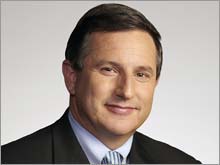|
Symantec should be next on HP's to-do list For his next move, HP CEO Mark Hurd needs to land a bigger fish.
SAN FRANCISCO (Business 2.0 Magazine) -- How badly did Wall Street want Hewlett-Packard to make a software acquisition? Listen to the tale of the tape: Despite paying a 33% premium for Mercury Interactive in a $4.5 billion deal, HP shares rose 42 cents - or 1.4 percent - on Wednesday. Normally, Wall Street inventors punish an acquirer's shares, but in this case, they applauded. HP CEO Mark Hurd should take the hint. If doubling the size of Hewlett-Packard's software business to $2 billion in annual revenues is a good idea, why not take the next step and triple it?
That may sound a bit glib. But in the cutthroat software business, bigger can actually be better, since corporate software buyers increasingly want to get as much of the software they buy from a few large vendors. At $2 billion, HP's software unit will still be small fry compared to Microsoft (Charts), SAP, Oracle (Charts) and IBM (Charts). And making more purchases like Mercury will be tough, because small software companies are just going to get more expensive. "This is only the beginning," says Citigroup analyst Brent Thill. "In the last few software transactions, the values have jumped. There are more bidders entering the market for these companies." But just down the road from HP in Cupertino, Calif., there's the perfect target: Symantec. Triple the fun Why Symantec? For one thing, at $4 billion in annual sales, it's one of the few software companies large enough to put HP's software revenues into the big leagues. There are also opportunistic reasons. Symantec doesn't have anything like Mercury's options scandal weighing it down, but it is struggling strategically, thanks to an acquisition it completed a year ago. When it bought Veritas for $13.5 billion last July, Symantec expanded from antivirus and security software into storage management. But the two business lines haven't meshed well, and the company's shares are down nearly 33 percent since the merger. Meanwhile, Microsoft is increasingly posing a threat to Symantec's security software business by building antivirus and firewall features into Microsoft windows. And EMC, a storage hardware maker which competes with Symantec in that arena, has been rapidly growing its storage software business. Additionally, HP's unparalleled retail presence around the world would help Symantec sell even more consumer antivirus and firewall software. Its corporate sales force could help sell Symantec's storage software to more Fortune 500 companies. And HP's army of IT consultants could include Symantec's security and storage software in more complex services deals. For its part, HP needs to do more to distinguish its increasingly commoditized PC and server business. And Symantec's products provide the perfect way to do that. Computer users don't care about most of the bells and whistles PC makers include. What they want, most of all, is a system that runs well and doesn't crash. Including Symantec's security software on every box would do more to distinguish HP's computers from the competition than anything else it might do. Imagine the ad campaign: "The other guys sell Windows PCs. We sell Windows PCs that work." Likewise, adding Symantec's storage software line would give HP's struggling storage business a mighty boost. Increasingly, it is software and not hardware that distinguishes one storage server from another. That's why EMC, primarily known as a hardware maker, has been spending so heavily on software acquisitions. A blockbuster deal Assuming HP (Charts) pays the same premium for Symantec that it paid for Mercury (Charts) - about 33 percent over the current share price - it would have to shell out $21 billion for the company. That would be by far the largest software acquisition ever, exceeding Symantec's Veritas deal. But HP would still be paying less than what Symantec was worth last October. And HP could well get to bolster its executive ranks in the bargain if it keeps Symantec (Charts) CEO Thompson on board. A longtime IBM executive before joining Symantec, Thompson could run the combined software group. From his days at Big Blue, Thompson's very familiar with the strategy of selling software alongside hardware and services. In just one move, HP could make it big in software, distinguish its PCs from the rest of the commodity pack, and give its salespeople more sophisticated technology to sell. Hurd's purchase of Mercury Interactive shows he's not afraid of doing sizeable deals. Now he just has to prove he can take on a really big one. Related: |
|

